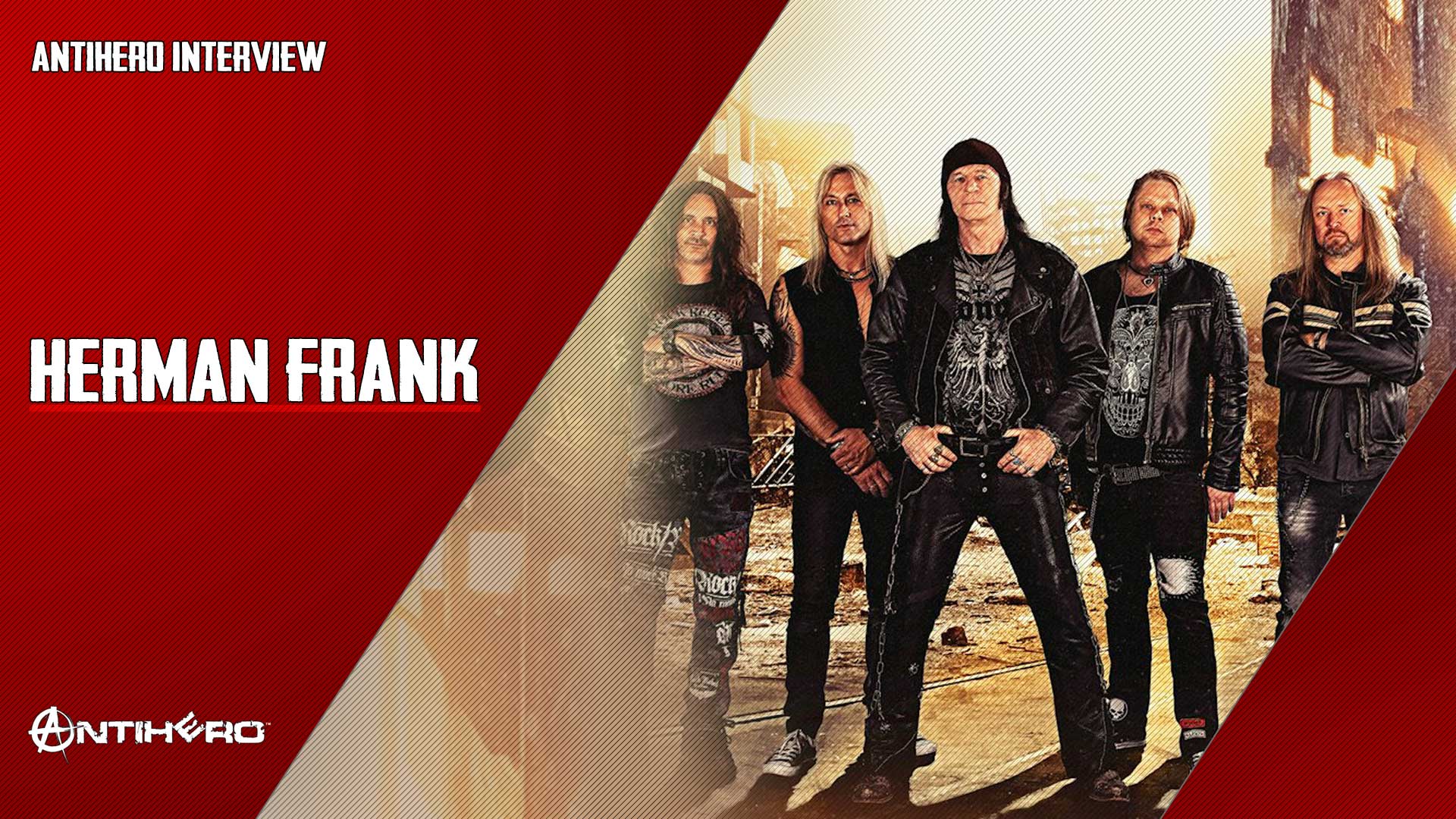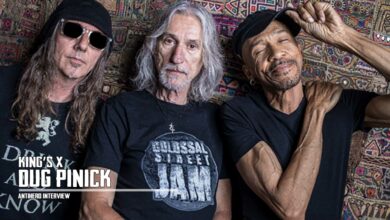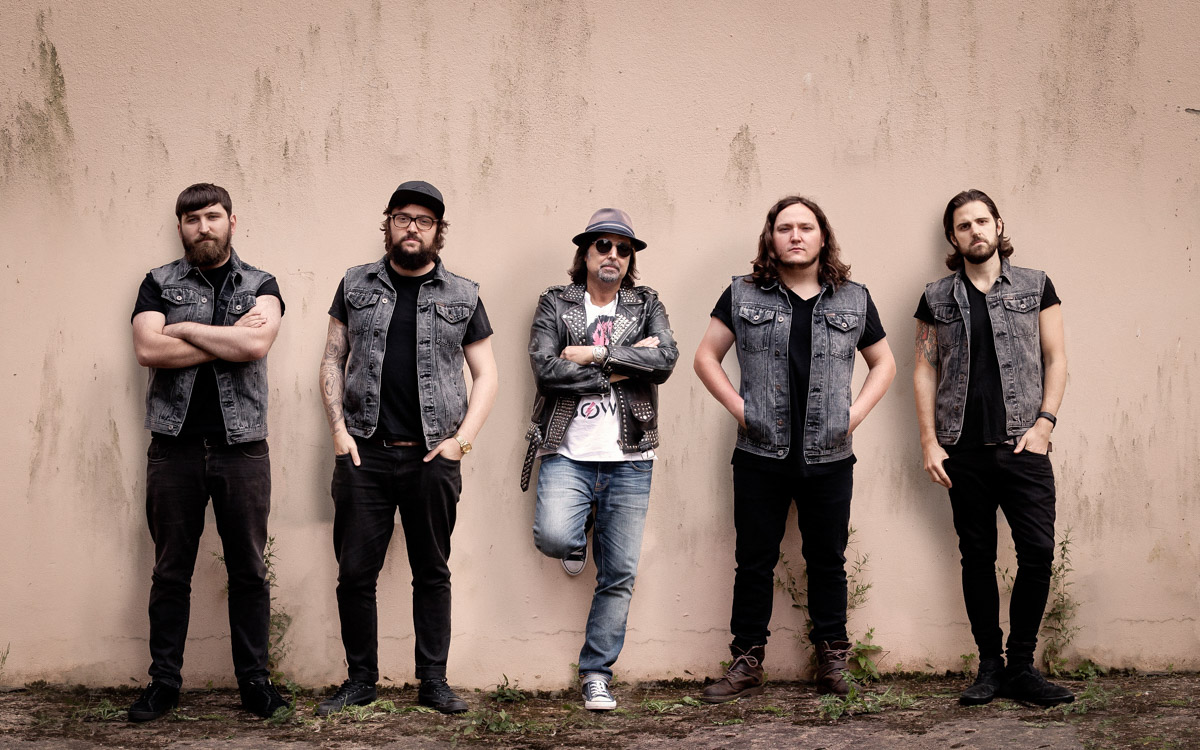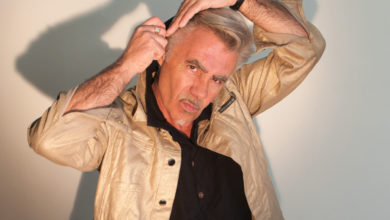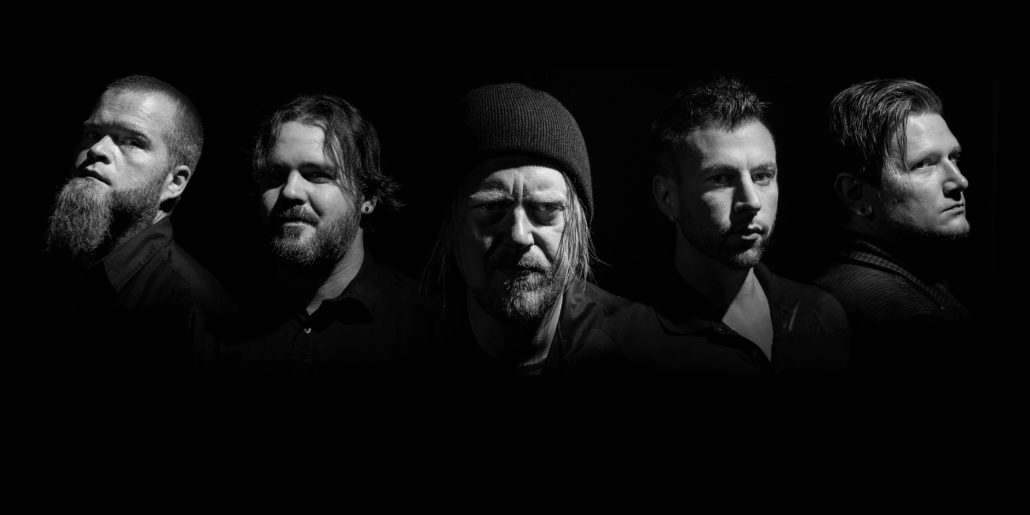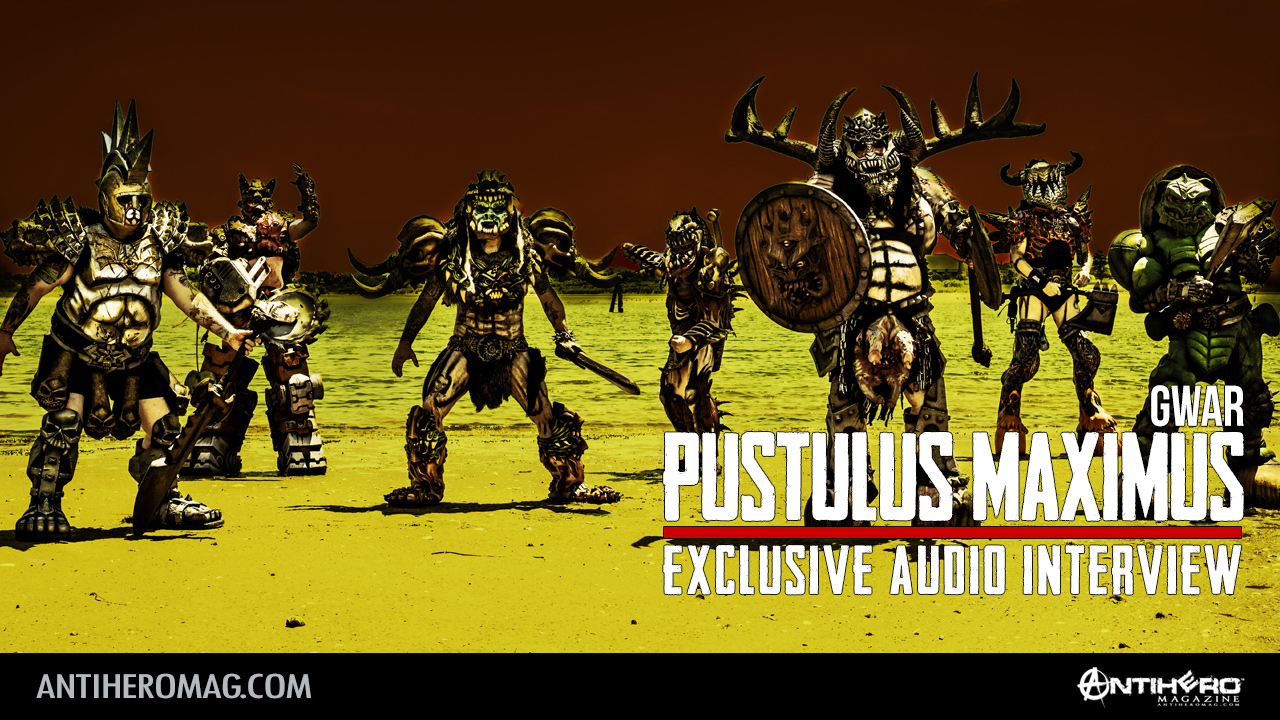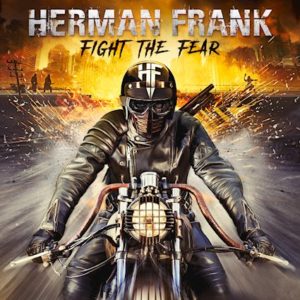 Herman Frank first came to my attention as part of the lineup of Victory, playing guitar on their great album release, “Culture Killed the Native“, which was released back in 1989. It was only later when my musical tastes went into harder-edged rock that I discovered the joyous delights of Accept and those classic early releases which also featured the same guitarist. In recent years, Herman has forged a career as a solo artist and producer – his solo albums allowing him to pursue that personal musical vision which he was unable to do as part of a band. This year’s “Fight The Fear” is his fourth solo offering and it was to discuss that release, as well as his long and very varied musical history, that we connected recently via the international Skype Airways. Just don’t be expecting an instrumental guitar album being released anytime soon.
Herman Frank first came to my attention as part of the lineup of Victory, playing guitar on their great album release, “Culture Killed the Native“, which was released back in 1989. It was only later when my musical tastes went into harder-edged rock that I discovered the joyous delights of Accept and those classic early releases which also featured the same guitarist. In recent years, Herman has forged a career as a solo artist and producer – his solo albums allowing him to pursue that personal musical vision which he was unable to do as part of a band. This year’s “Fight The Fear” is his fourth solo offering and it was to discuss that release, as well as his long and very varied musical history, that we connected recently via the international Skype Airways. Just don’t be expecting an instrumental guitar album being released anytime soon.
ANTIHERO: You have recently released ‘Fight the Fear‘ which is your fourth solo album in quite a short period. Do you feel you’re in the most prolific part of your career?
Herman Frank: I mean it’s not really that long ago. The last album had been released two years ago, so I think it’s okay. In the old days when I grew up, we released maybe every year or every half…one and a half year albums. So, I think it’s quite fine, and I think the time is right this year, so a lot of people say it’s the best album I’ve ever done.
ANTIHERO: Do you feel that making albums gets easier as you get older?
Herman Frank: No, that’s why I choose to call it ‘Fight the Fear‘. Every new album I have to fight the fear so I can find a couple of new riffs or riffs I haven’t used yet, and melodies and stuff like that. It’s maybe that I have a little bit more experience is all. For sure you have much pain, but getting easier? No. It’s like every album I did before is still fighting for the right thing, and still trying and trial and error.
ANTIHERO: Do you feel that the latest album represents more of a ‘band project’ than maybe your previous solo albums which were Herman Frank?
Herman Frank: Well, I mean in this album … the same people played, you know. So, it’s getting easier and also quite fun, but Andre the drummer for sure and singer Rick Altzi. They know the things I’m looking for the beats or the rolls. Really the bass player is quite easy to work with him now. And Rick for sure it’s getting easier so he can follow my idea. But I’m using the same procedure as the three other albums. I compose it anyway all the songs and it’s a lot of melodies for the signing. Maybe it’s getting easier in this way; that everybody knows now the groove I’m looking for, the speed, the roughness. I don’t have to keep people for every break or when I have this feeling of misdirection.
ANTIHERO: Did you produce this solo album as well?
Herman Frank: Yes.
ANTIHERO: Is it difficult, I mean obviously you’ve worked with other acts, is it difficult to actually have two hats? Both a producer and a musician, or do you feel it’s actually easier?
Herman Frank: Actually, I would love to have a producer. But Andy Sneep was booked for a long time. He’s on the road with Judas Priest. Congratulations! I would have liked to have had that job. But I mean it’s not that easy to find a producer that you can trust, and a producer who works, in the same way, thinking about the music you do. And there are not that many good producers that I would love to work with, you know? If I would have time enough and money enough, I mean there are a couple. But, in this kind of situation right now it’s easier, faster and cheaper. Let’s put it this way; affordable that I produce it. I mean it’s the double thing that you have to be a musician and a producer, you never can ask somebody and there’s no charge. You have to charge yourself. That’s the most difficult part and I still don’t love this.
ANTIHERO: Of course, you’ve actually produced other bands, Saxon and Molly Hatchet, for example. Do you find it’s more difficult to produce somebody else?
Herman Frank: No, for me it’s much easier. I’m right now in the studio to do production for some type of musical coming up and it is much easier because you only have to follow the musician and just listen, and you have much easier kind of fantasy you need to bring it up to a certain level, a higher level. If you compose the music by itself, you’re so stuck into your melodies and stuff that maybe you’re stuck too much in this. If you listen to music from other people, there are more ideas. For example, I could have more ideas. For me, it’s much, much easier, as I said.
ANTIHERO: Yeah, of course looking at your musical history we have to mention ‘Accept’. You rejoined them in 2005 and then left again in 2014. Do you think it was a mistake going back to that band…or not?
Herman Frank: No, no otherwise I would have left earlier. I’m old enough to see what I’m doing or know what I’m doing, at least I think I know what I’m doing. But the time I left the band I just said, “It was the right time to.” When I started with my first band in the very older days, that’s the kind of feeling I wanted to have back, you know? Be responsible for my music, write music, write my songs, play my solo guitar and stuff like that. And it’s hard, it was just the right time. It’s really exciting for me right now and I’m looking forward. I don’t want to waste time, I’m getting too old for this.
ANTIHERO: I see your solo albums as a natural development from what you created from what you did with Accept. It was a natural musical evolution, your work with ‘Victory’, however, I feel it’s something different. It’s a different musical style. What’s the state of ‘Victory’ at the moment? Is that a band that is not doing anything, or is it still something that you want to do something with?
Herman Frank: I wish I would…there’s a ready record, it’s already composed and stuff like that. The bad thing is that it’s a real shame, the singer, he can’t go on for singing. The throat is really sick. I mean he never trained his voice and as a singer, you have to train your voice, but a lot of people don’t do that. He was just yelling, ‘1, 2, 3, 4, yell’. And that works for a certain time maybe and somebody gets luckier for a couple of months or years. It’s a shame, and he has to stop to sing. To find another singer for ‘Victory’ is not that easy after Fernando, after Charlie and if you know somebody and please tell everybody “I’m looking for a good singer”. You are very welcome to contact me. I would love to go on with the band, you know?
ANTIHERO: Yeah, I particularly remember growing up, I had that ‘Culture Killed the Native’ album and I really liked that. You toured with Gary Moore on that album, how was that experience?
Herman Frank: I mean we’d be truthful with him and he’d be one of my favourites, you know? He’s one of my idols from the start, and I was very happy to watch him at the tour dates. It was not that easy to get a moment to talk to him at this time, maybe when I’m getting more famous, right now I would have had the chance. So, I missed the chance. But as a guitar player, it was a great experience to watch this guy.
ANTIHERO: Yeah, how do you see your guitar playing? Do you see it as physical or is it something more than that, maybe something spiritual?
Herman Frank: Good question. I really couldn’t tell. No answer for this one.
ANTIHERO: How do you feel when you play, mentally? Does it take you away from the everyday things of the world? Do you feel that it helps you to escape?
Herman Frank: I mean I still love to play. I mean I don’t have to sing and maybe I don’t have to sing like in the younger years. I’m practising everyday for 6 hours. But I still do like it. These days it’s more in a term of times, you know? You practise a lot when you’re recording an album and try to put something down. And then you leave it a little bit slower and then you have to come back and try to reproduce what you recorded in the studio. And that’s the tricky part. So, it’s still, it’s quite interesting.
ANTIHERO: Do you have any time for hobbies or interests outside of music? Or is music everything to your life?
Herman Frank: Oh sure, I mean I don’t spend the whole day on music, I would go crazy. There has to be at least an hour for drinking. I’m just joking, once in a while I still go to the pub. I do love this.
ANTIHERO: What do you like to do there in your spare time?
Herman Frank: Well there’s a need to clear your mind, you know? I mean you have to erase the disc in your head, once in a while. I still love to go for sports. I don’t know the right word in English version, it’s like the Japanese and Chinese kung-fu style something. I don’t know the right words. And, I mean, I’m getting older but I’m still fast.
ANTIHERO: How do you view, looking back, how do you view your musical back catalogue? Do you go back and listen to albums you’ve done many years ago or do you prefer to focus on what lies on the road ahead and what you’re working on now?
Herman Frank: I mean that’s up to the record companies, you know? You are not in control or most are not in control with what they do with their back-up catalogue or what you’ve done. I’m always looking more for a positive future than the past. Otherwise, you should have to stop, on the other side, you have to be really optimistic about the future. It’s getting worse and worse for the record sales Spotify is taking over and that’s not that good for musicians.
ANTIHERO: It doesn’t help if you spend a long time putting a lot of effort, a lot of time into creating an album and then essentially you don’t make any money from it. So you’re working for free.
Herman Frank: More or less, I’m still in a lucky position that I get some money out of this thing, otherwise I really would have to stop it all, I wouldn’t do it anymore. I’m not doing it just for money but just doing it for free? That doesn’t make sense. It’s a shame that Spotify, the office, is getting so less money on a low budget.
ANTIHERO: So that’s why you guys have to go out and tour a lot because you can only make money from touring.
Herman Frank: Everybody is going on tour and in Germany or in Europe you want it in the clubs that have free dates, you know? And with Triple-A bands go on tour then the Double-A bands go on tour, It’s not that easy anyway, everybody’s going on tour and it extends a couple of years in the live show. There are not that many people eager either. So, it’s getting worse and worse.
ANTIHERO: Do you still have goals, dreams, and ambitions?
Herman Frank: I would love to have a couple of shows national. I still like it and love it when in the club, not a big audience, 400 seats or 500 seats that is packed and I can play my guitar. That’s still one goal I’m looking for, and there are some others.
ANTIHERO: Would you ever consider bringing out an instrumental guitar album with no singing?
Herman Frank: No.
ANTIHERO: No? why not? It would be a challenge creatively to do something different.
Herman Frank: No, leave this up to Steve Vai
ANTIHERO: That’s never something that interests you, no? Where you can do different styles with just the guitar?
Herman Frank: I grew up in the time where a band has a singer, you know? It’s a method and a melody that people can follow. If you do a guitar instrumental record, after five minutes people leave. That’s okay for the guitar players, you know, anybody else leaves after five minutes and say, “let’s go have a beer or something”. That’s not meant like this. I still love it when a singer’s there.
ANTIHERO: Just returning then to the album itself, do you have any touring plans?
Herman Frank: I think we’re starting in the middle of April in Germany, a couple of shows, and then we will see how the record’s looking. If it sells good, maybe there’s a chance to come over…you’re from Britain, from England, no?
ANTIHERO: Yeah, correct. Yeah, that’s why I was asking.
Herman Frank: Maybe a show in London.
ANTIHERO: Yeah, okay just a final one then Herman; if the roles are reversed, who would you like to sit down and interview?
Herman Frank: Rob Halford. Yeah sure, or Eddie Van Halen.
ANTIHERO: and just discuss guitar?
Herman Frank: And I would love to talk to Mr. Blackmore.
ANTIHERO: That’s great, thank you very much!
Herman Frank: Alright thank you for taking the time.

